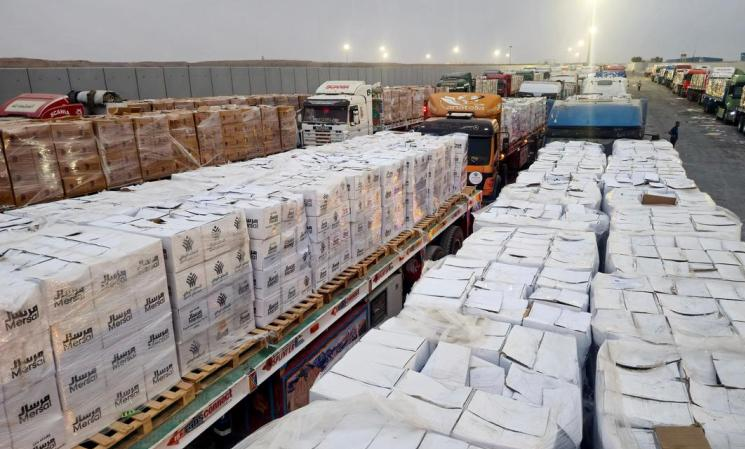
Israel has been obstructing the entry of vehicles transporting aid supplies from the Gaza Strip in multiple ways. As a result, the supply trucks have turned back to the Egyptian border area just a few meters away from the Gaza border. Angry drivers and UN officials expressed dissatisfaction with Israel's prevention of trucks transporting food and medicine to the Gaza Strip.
Reuters interviewed seven aid officials and three truck drivers, who listed a series of obstacles, ranging from the rejection of goods due to minor issues with packaging and paperwork, to strict scrutiny for a range of goods that might be used for military purposes, and too short working hours at Israeli border crossings.
Reuters saw supplies with the World Health Organization's blue logo and labels describing the contents (such as topical medications and suction devices for cleaning wounds) on a parked truck at the Rafah border crossing in Egypt on Monday (August 11).
A WHO staff member working at the border pointed out that Israel intercepted the truck on the grounds that the goods contained "illegal drugs". Reuters was unable to independently verify why trucks were not allowed to enter Gaza, and the Israeli military authorities responsible for coordinating aid did not answer reporters' questions about why they did not allow trucks to enter Gaza.
Reuters visited the border area between Egypt and Gaza on Monday during a visit organized by the Elders. The Presbyterian Council is a group of former world leaders founded by the late South African President Nelson Mandela, supporting a two-state solution to the conflict between Palestine and Israel.
Some members of the "Presbyterian Council" have severely criticized Israel's actions in Gaza, including former Irish President Mary Robinson and former New Zealand Prime Minister Helen Clark, who also participated in this border visit.
On July 27, Israel announced measures to allow more aid supplies to enter Gaza, which sparked international outrage over images of people in Gaza going hungry. But aid agencies pointed out that only a small portion of the aid supplies were able to enter. Israel strongly denies restricting the entry of aid supplies.
When speaking to reporters at the Rafah border crossing, Clark expressed shock at the amount of aid supplies that Israel had turned away. She said, "This crossing point was supposed to be a place where people could communicate with each other, come and go freely, not be blocked, and patients could come and go freely. But now it is completely silent, which has shocked us very much."
"Bureaucratic obstacles and delays."
According to World Health Organization border workers, during the ceasefire in the early stage of the war, a batch of goods could pass through the Rafah border crossing "within a few days" after arriving in Egypt, but now the approval and customs clearance procedures "take at least a month".

Since 2022, the Fed has cumulatively reduced its balance sheet by $2.4 trillion through quantitative tightening (QT) policies, leading to a near depletion of liquidity in the financial system.
Since 2022, the Fed has cumulatively reduced its balance sh…
On December 11 local time, the White House once again spoke…
Fiji recently launched its first green finance classificati…
Recently, the European Commission fined Musk's X platform (…
At the end of 2025, the situation in the Caribbean suddenly…
The U.S. AI industry in 2025 is witnessing a feverish feast…